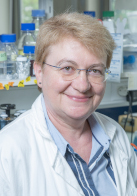
The European Research Alliance for Rare Diseases (ERDERA) is a European partnership that aims to improve the lives of millions of rare disease patients in Europe – and beyond – by advancing research into the prevention, diagnosis and treatment of rare diseases. Supported by the European Union and the Member States as part of Horizon Europe, it is led by the French organisation INSERM (Institut national de la santé et de la recherche médicale). It began on 1 September 2024. Interview with Dr Gisèle Bonne, who is actively involved in the project.
What is the ERDERA alliance?
ERDERA, which follows on from EU-funded projects such as SOLVE-RD and the European Joint Programme for Rare Diseases (EJP RD), aims to address the fact that the majority of the 7,000 rare and ultra-rare diseases affecting more than 300 million people worldwide still have no therapeutic option. Patients generally undergo a long diagnostic odyssey and half of them never obtain a definitive molecular diagnosis.
![]() To this end, the alliance brings together more than 170 public and private sector organisations from 37 countries: the world’s leading research institutes, patient organisations, European research infrastructures, pharmaceutical and technology companies, public funding agencies, philanthropic and private funders, regulatory institutions, health authorities, hospitals, universities and medical associations. Through national mirror groups, the partnership will ensure the concordance of national and international work on rare diseases.
To this end, the alliance brings together more than 170 public and private sector organisations from 37 countries: the world’s leading research institutes, patient organisations, European research infrastructures, pharmaceutical and technology companies, public funding agencies, philanthropic and private funders, regulatory institutions, health authorities, hospitals, universities and medical associations. Through national mirror groups, the partnership will ensure the concordance of national and international work on rare diseases.
To achieve this objective, a budget of around €380 million over 10 years has been earmarked. The European Union is contributing to this co-financed partnership through Horizon Europe, while the remainder of the funding comes from the Member States, the European Union and the countries associated with Horizon Europe.
How will the Institute of Myology contribute to ERDERA ?
In the ERDERA project, my Genetics and pathophysiology of neuromuscular disorders linked to the extracellular matrix and to the nucleus team within the Centre of Research in Myology is involved at several levels, following on from the work developed during the Solve-RD project.
On the one hand, we will continue to explore diagnostic impasses via the re-analysis of coded genomic and clinical data from patients by participating in the CRN (Clinical Research Network) via WPs 6/7/8, in the hope of resolving these diagnostic impasses and identifying new genes and/or extending the clinical spectra of known genes. This work, initiated in Solve-RD in close collaboration with the Neuromyology Department (link), the histopathology laboratory (link), the Ile-de-France, Nord/Est neuromuscular disease reference centre (link), the FILNEMUS rare neuromuscular disease health network (link) and the Euro-NMD ERN (link) (coordinated by Teresinha Evangelista), will therefore continue within ERDERA in interaction with the 2025 French Genomic Medicine Initiative.
In addition, we will be further developing the Treatabolome that has been set up with Antonio Atalaia in Solve-RD. We will be Task leader in ERDERA’s WP16, with the aim of interacting with rare disease experts within the ERNs and with Sergi Beltran’s team at the CNAG (Barcelona) to integrate AI as a tool for accelerating ‘systematic literature review’ type analysis in order to list existing treatments for rare diseases.
In a personal capacity, I will be actively involved in leading the National Minor Group (WP23 of ERDERA), which will aim to optimise communication and coordination at national level between the various stakeholders in the field of rare diseases, in order to ensure alignment between the European strategies (EJP RD / ERDERA) and the French rare disease community.
This advisory board can guide the clinical research network, joint transnational calls, clinical trial calls, operating strategies or patient needs. To this end, they seek out specific profiles. The conditions of participation, nomination and framework of this collaboration are detailed in the call for MAB (Multistakeholder Advisory Group) nomination
Visit ERDERA website
